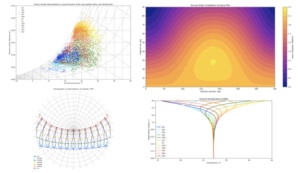Topic for the day: Sustainable Architectural design practices
Date: 4th October 2021
Time: 12:00 pm UK time, 4:30 pm IST
 Duration: 45 min introduction and demonstration, 15 min break, 30 hands-on session and 10 min feedback session (Total 1:50 hour)
Duration: 45 min introduction and demonstration, 15 min break, 30 hands-on session and 10 min feedback session (Total 1:50 hour)
Registration Link: https://attendee.gotowebinar.com/register/5199843793270991630
Brief Write up about the session: Around 25% of global GHG emissions are due to energy use in buildings, but this can be minimised through good design practice. Understanding where the best carbon-saving opportunities (and the threats due to climate extremes) lie, begins with the analysis of climate. This includes understanding: the severity of solar radiation, temperature, humidity and wind; the need for solar shading to reduced cooling demands and how these devices should be considered; the potential for passive heating, lighting, ventilating and cooling techniques to reduce applied energy demands; the potential for renewable energy technologies, to avoid using energy from the grid to meet these demands.
Architecture, architectural engineering and urban design students learn how to analyse climate as part of their studies; and design professionals routinely do this in practice. But existing climate analysis software is either closed source, based on dated technology or is insufficiently comprehensive.
To address this, Darren has developed a comprehensive climate analysis toolkit called PyClim, that uses powerful modern graphical and statistical analysis techniques, and is open source. In this session I will introduce the background to and demonstrate the use of PyClim. Participants will then be invited to use PyClim to analyse a climate of their choosing. The session will close with a short feedback session to inform the future development of PyClim.
Name of the Speaker(s): Prof Darren Robinson
Designation(s): Professor
Affiliation(s) : The University of Sheffield
 Darren Robinson is Chair in Architectural and Urban Sciences at the Sheffield School of Architecture, where he is Director of Research. His personal research activities lie at the intersection between social physics (people), building physics (buildings) and urban physics (city): people • buildings • city.
Darren is also passionate about teaching, and enjoys teaching introductory physics to Architecture, Urban Design and Engineering students. He developed PyClim as a learning resource for his students at Sheffield and for other students elsewhere.
Darren Robinson is Chair in Architectural and Urban Sciences at the Sheffield School of Architecture, where he is Director of Research. His personal research activities lie at the intersection between social physics (people), building physics (buildings) and urban physics (city): people • buildings • city.
Darren is also passionate about teaching, and enjoys teaching introductory physics to Architecture, Urban Design and Engineering students. He developed PyClim as a learning resource for his students at Sheffield and for other students elsewhere.
Darren has over 100 refereed scientific publications to his credit including the book “Computer modelling for sustainable urban design”. He is a recipient of the: BAE Best Paper Award (2009, 2010); CIBSE Napier-Shaw Medal (2007); FWO King Albert 1st Medal (2020); JPBS Best Paper Prize (2010/11); Sustainability Science Most Outstanding Article Award (2019).
